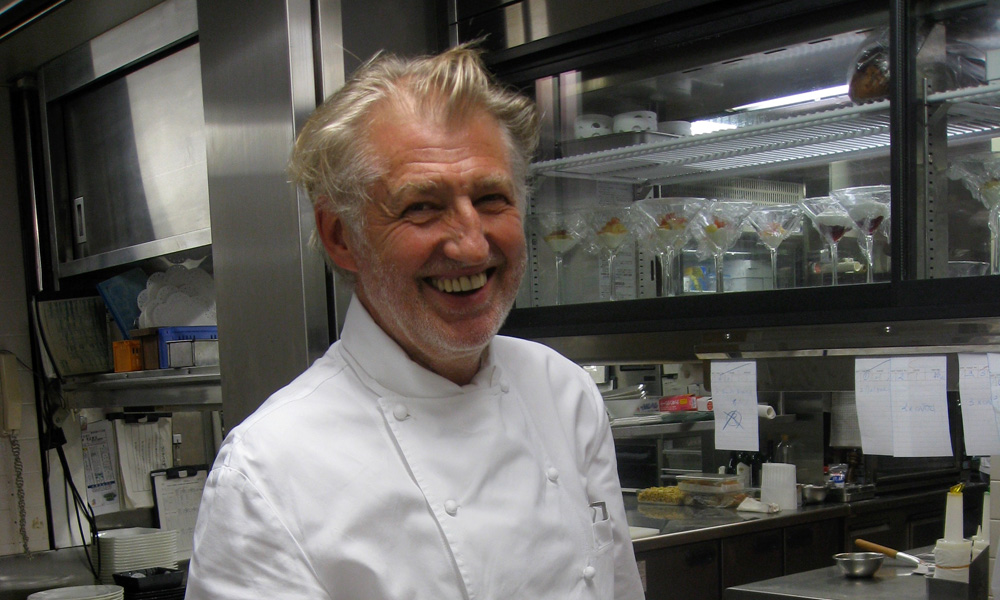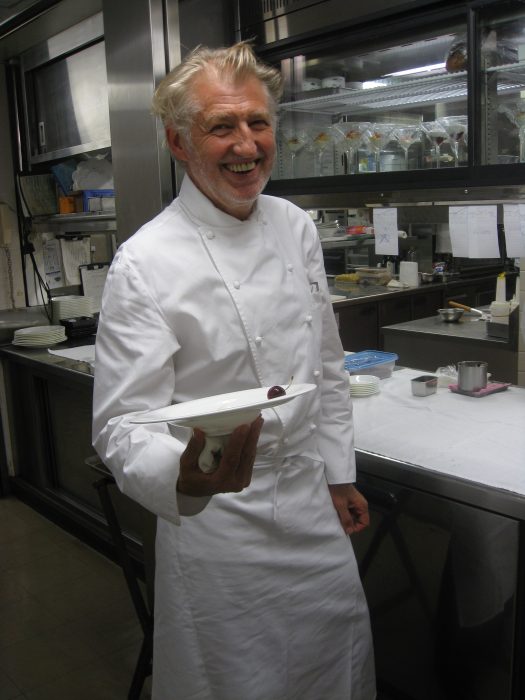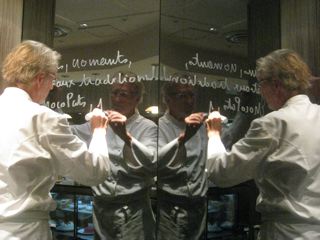
Words to Live by: Chef Pierre Gagnaire
Interview by Judit Kawaguchi

I’m very lucky that I am a little talented with my hands. One day I realized that, for me, it’s possible to tell a story with food. That’s all I know how to do. Only that.
Food is a way to give tenderness to people. I put all my love and energy into my dishes. For 42 years I’ve been trying to be honest and to define food as a part of life. My form of expression is cooking, but it’s not the food, it is the people (those who make it and those who eat it) who are the most important ingredients in life. And that’s the simple truth, no matter how elaborate my dishes get.
The best recipe for happiness is to give pleasure to others.I feel so good because I create little links between so many people with my cooking. When they eat my dishes, they feel something and somehow it all clicks: Through the meal, people connect to those who they share the dishes with. The food can also conjure up some memories that allow them to have conversations they might not have had otherwise. Food is a communication tool.
Love is serious. When my restaurant in Aoyama was shut down, I called my chefs’ moms to reassure them. “I’ll take care of your son. Please don’t worry!,” I told them. Every chef who works with me is my child, my son or my daughter. I feel responsible for them. I have these babies, these little orchids, in 10 hot kitchens around the world, so I must make sure they are thriving. I can’t just stay with one kitchen, I have to circle around and visit all of them.
Cooking is storytelling. I let the ingredients tell their own narrative. The vegetables, the fish, the fruit — they all talk to me. Hokkaido potatoes describe the farmers who watered them and Aomori apples paint a picture of the elderly couple who wrapped paper around each fruit to protect it from the cold. I speak their language, no matter which country those little potatoes or fruits are from. I listen and we make stories that take the form of different dishes. Once these stories are out on the plate, the guests also allow the food to talk. The dishes aren’t just consumed; the people who eat them add more character to each plate, so the creative process continues outside the kitchen, in the dining room.
My life is my work and my work is my life. I chose this way of living and I love what I do, but actually, I’m kind of like a prisoner. A happy one, but jailed because unless I worked as much as I do, I’d worry about the quality. But that’s always the dilemma of any professional. Before you make it and are doing very well, you have to work so hard. You assume that once you succeed, you can take time off, but those days of rest never come!
Only people excite me, not things. When I meet someone, I want to feel the person’s energy. That’s my life force.
To be a restaurateur, one must be part artist and part businessperson. If one is only an artist, it can be impossible to make it. This is because we put a price tag on pleasure. It seems infantile, but it must be done. Yet even at the level of our prices, we don’t make much money — good products are very expensive and our kind of cuisine, considering the talent behind it, is time consuming. A good meal has a lot of value but a small profit margin.
Food is nourishment for the soul and the mind, as well pleasure to the body. The first time I came to Tokyo, in 1984, I had already been working for myself for seven years. Japan was a revelation: My feelings about cooking were confirmed here. In Japan, food is not just food: It’s a philosophy, a garden, a poem, a sculpture, a way to something, a path to the universe. I tried to learn that. Since then I have had a very good relationship with Japan. Japanese people love detail and quality as much as I do.
Writers tell the same story in every new book they publish. If it’s a good one, we keep reading them. When I open a book, I fill myself on its atmosphere. That’s what I love — a book’s ambience. The story is just an improvisation around the same scenario. It’s the same for what I do, too: I offer a few hours of dreamtime, so that you forget the city that you are in and you’re transported to mysterious and magical places.
There are some nice, what I call “flat” people in the world, but I prefer working with those who have little stars in their eyes. That makes it all worthwhile. The earth is round, so get rounder — at least in spirit!
I hope there are some more stories in me. I’ll keep working as long as I can, and I hope that in the future my chefs and staff will use my name and continue my story — with the guests, of course. I hope there’s more to this story than what’s been written so far.
A version of this interview appeared in the Japan Times

This QuoteCooking is storytelling. — Pierre Gagnaire